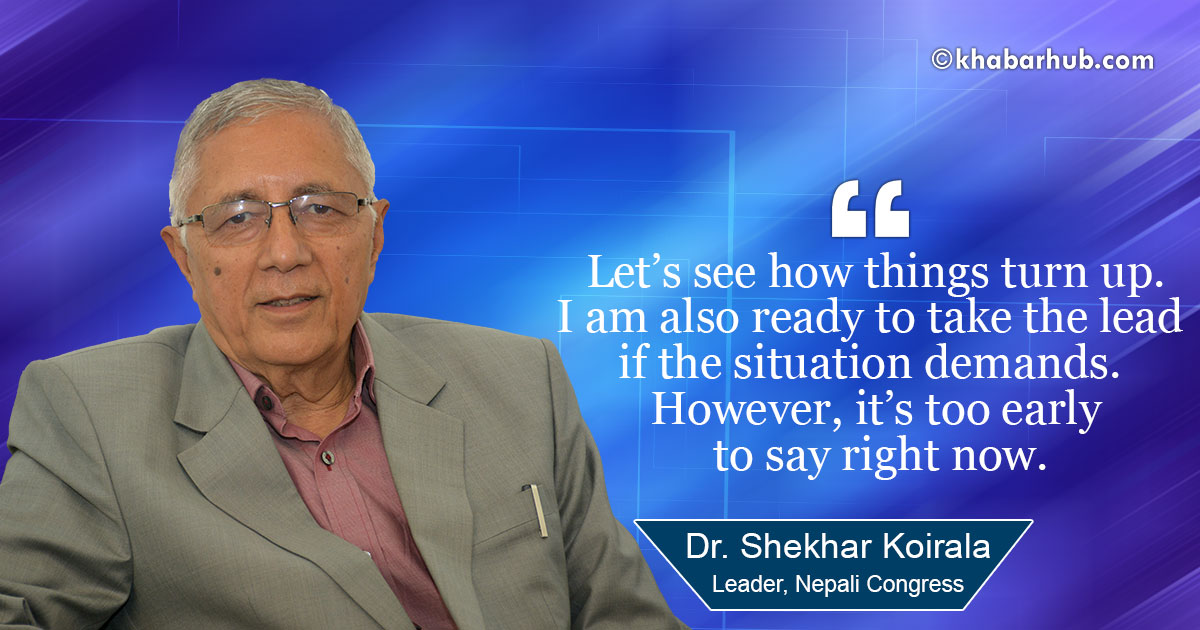Nepali Congress, which faced a debacle in the parliamentary elections in its history, has been mired in factional politics. Over 50 district party presidents gathered in Kathmandu calling for change of guard in the party leadership. However, leaders loyal to President Sher Bahadur Deuba have been protesting the move, arguing that it will only fuel unhealthy competition thus weakening the party.
Khabarhub caught up Dr. Shekhar Koirala, influential leader of Nepali Congress, for his views on the differences lately seen in the party, imminent General Convention and latest political developments in the country. Excerpts:
The two-day meeting of Nepali Congress district presidents in Kathmandu has been widely speculated as a ploy to weaken party president. How far is it true?
The meeting among like-minded people cannot be taken as unusual. And, I believe, that such meetings should not be dragged into controversy. The concern is that intra-party democracy has to remain intact. There is no point going against such meetings.
You seem to be busy these days. Does this indicate that the party’s national convention is drawing closer?
True, the national convention is approaching. The party has not yet prepared for the same. Currently, I have been visiting the districts interacting with district-level leaders and party supporters. To be candid, I love to visit villages rather than district headquarters.
Dr. Shekhar Koirala at the party helm is what has been anticipated. Do you have any plans to lead the party?
In fact, there are some senior colleagues in the party. I am currently learning from them. Some of them are aspiring to take the lead. Let’s see how things turn up. I am also ready to take the lead if the situation demands. However, it’s too early to say right now. The government has failed to live up to the people’s expectations. The government is losing credibility. The opposition is not gaining popularity, either.
The image of an institute depends upon the people who lead it. If those responsible do not work efficiently, facilities or equipment will be meaningless, no matter how sophisticated they are. The existing leadership is not dependable. There might be various reasons. Taking the government’s helm for a long time without fulfilling people’s expectations could be one of them.
Do you think it is the lack of dynamic and cultured leadership that ultimately led to the downfall of the Nepali Congress?
Public say (that) we should have preserved the monarchy. But I don’t think so. Things went worse in the long run due to our own weaknesses. The reinstatement of the monarchy depends on the demand of the people. Regarding federalism, Nepali Congress was in the dark about the condition of local units. We discussed it with the district presidents. The situation was turning unfavorable for the party. We failed to sense future consequences.
With whom did you align with – Rastriya Janata Party Nepal (RJPN), Federal Socialist Forum Nepal (FSFN) during the elections?
President should understand it. We sacrificed seat for Kamal Thapa while Thapa did not support Sitaula. It is unfair. Similarly, at times, we supported then Communist Party of Nepal (Maoist Center) in favor of Renu Dahal. We did not demonstrate any seriousness over any constitutional issues when it came to amendment. It was great a mistake. Interestingly, we never asked why we voted in favor of Renu Dahal. NC will never win any seats in Chitwan in the days ahead. Similarly, it remains unanswered why NC scarified seats for Upendra Yadav and Mahantha Thakur among others, and for what reasons. Which party sacrificed a seat for Shekhar Koirala? The party president should understand this. Further, in the political proposal of the Mahasamiti meeting, ‘parliament reinstatement’ should have been codified. This is a history. International community is watching this.
What is the economic and religious vision of Nepali Congress?
People elected Nepal Communist Party. There is a two-thirds government in the country. However, the country still seems to be mired in political instability and uncertainty. Why is it so? Geo-politically, Nepal lies between two big powers – China and India. Besides, America and Europe have influence in Nepal. They have their own particular interest. A big problem looms large before Nepal. China is creating its influence with Belt and Road Initiative (BRI) on one hand while America is spreading its influence with Indo-Pacific strategy on the other. In this context, Nepal has to move ahead by maintaining balanced ties with the international community. Currently, we are paying our attention to only two countries – India and China. We should not be oblivious that there are other neighbors, too. Besides, we should take donor countries into account.









Comment